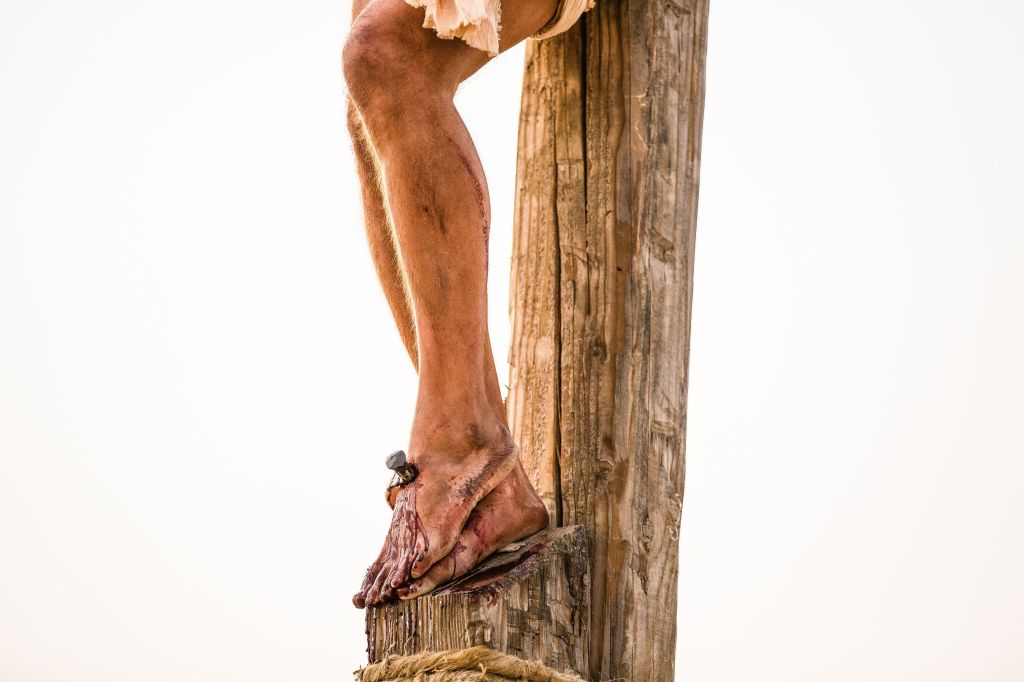
This is Part 7 of a multipart series connecting Jesus to the suffering Messiah in Psalm 22. In my last post I blogged about the “strong bulls of Bashan” attacking the him. This foreshadowed the spiritual battle between Jesus and his enemies, both human and supernatural.
The Cosmic Battlefield
Tying all the past blogs back to the crucifixion, Psalm 22 describes the cosmic battle between good and evil. On Golgotha–Hebrew for the place of the skull (have you ever wondered, “Whose skull?”)–evil thought it had triumphed over Jesus by murdering him. However, the Messiah’s sacrificial death was always the plan. With his blood he redeemed humanity from their sin of transgression. This plan from “before the creation of the world” was hidden even to those in the divine realm. It was a plan only known by the triune Godhead.
Paul was convinced of this when he wrote,
None of the rulers of this age knew this wisdom, because if they had known it, they would not have crucified the Lord of glory.
1 Corinthians 2.8
The demonic forces—the “rulers of this age”—didn’t have a clue this was how Yahweh had planned to conquer evil from the very beginning. They encircled and surrounded the Messiah and directed his human enemies to inflict pain, hurl insults and crucify him. The evil alliance played into God’s hand foretold in the prophetic poem, “scorned by mankind and despised by the people. All who see me mock me; they make mouths at me; they wag their heads” (22.7). David writes his enemies were like a pack of wild “dogs”—a derogatory term Jews used for Gentiles—surround their victim for the final kill. Their nails were like lions’ “teeth” piercing (or disfigure) his hands and feet. And these Gentiles (Romans) divided his garment and cast lots for his robe. Thus he cries out for his God, his heavenly Father, to come to his aid in his most agonizing hour and deliver him from these animalistic foes. He had an unwavering confidence that God would hear and answer.
The Victor
Jews during the Second Temple period saw Mount Hermon in Bashan as the rival mountain to Mount Sinai (Psa 68.8), the mountain where Yahweh first made his covenant with Israel. In cosmic geography, mountaintops are where the gods live because they are lofty and inaccessible to humans. But, as David prophesied in Psalm 68, Yahweh will lead his divine army to conquer Mount Hermon by defeating his rivals gods (they’re really no rivals because he is supreme), and making it part of his eternal abode as the victor,
15 O mountain of God, mountain of Bashan;
Psalm 68.15-18
O many-peaked mountain, mountain of Bashan!
16 Why do you look with hatred, O many-peaked mountain,
at the mount that God desired for his abode,
yes, where the LORD will dwell forever?
17 The chariots of God are twice ten thousand,
thousands upon thousands;
the LORD is among them; Sinai is now in the sanctuary.
18 You ascended on high,
leading a host of captives in your train
and receiving gifts among men,
even among the rebellious, that the LORD God may dwell there.
This conquest of the enemy’s territory is the reason Paul cited Psalm 68 in Ephesian 4.8 to show the resurrected Jesus is the prophesied Yahweh who conquered Mount Harmon—death and Hades (Sheol)—and led them as prisoners in the victory parade, all the while giving spoils of war to his people as their warrior king.
I can’t imagine on Golgotha the Pharisees and chief priests who witnessed the entire Psalm 22 (not to mention Psalm 68 after Jesus’s resurrection) unfolding right before their eyes didn’t make the connection. Just as Paul alluded, they were duped by the god of this age to deny the obvious (2Co 4.4).
Conclusion
I hope this series on Psalm 22, which began by exploring the misunderstood meaning behind Jesus’s outcry on the cross on April 4, 33 AD, almost 1,990 years ago to the date, has aided your understanding of Matthew 27.46. It wasn’t the cry of a despondent Jesus because his Father had forsaken him. It was Jesus, the very subject of the psalm, pointing those who stood beneath the cross what they are witnessing was foretold in the Scripture a millennia before. Ultimately, he shows them that God will not abandon his people but instead can be trusted to come to deliver them when they cry out.
This God will deliver you like the crimson blood of the Paschal Lamb, and purge your heart of the corruption by sin to purify you as the two sacrificial goats of Yom Kippur. Both of these are typological symbols that telegraph the mission of the Messiah: to redeem those who place their believing loyalty to him.
Have you pledged your believing loyalty to him? If so, praise and worship him on this Good Friday for the pain and suffering he endured to make it possible. If not, what is holding you back?